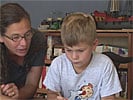SEL Parent Workshops: How Group Dynamics Enhance Problem-Solving and Parenting Skills

Check out our blog for social-emotional learning articles, news, and more!
 Summary: Parenting programmes that are delivered in group settings have the potential to help parents develop parenting skills that improve the behaviour of their young children. This review provides evidence that group-based parenting programmes improve childhood behaviour problems and the development of positive parenting skills in the short-term, whilst also reducing parental anxiety, stress and depression. Evidence for the longer-term effects of these programmes is unavailable. These group-based parenting programmes achieve good results at a cost of approximately $2500 (?1712 or ?2217) per family. These costs are modest when compared with the long-term social, educational and legal costs associated with childhood conduct problems.
Summary: Parenting programmes that are delivered in group settings have the potential to help parents develop parenting skills that improve the behaviour of their young children. This review provides evidence that group-based parenting programmes improve childhood behaviour problems and the development of positive parenting skills in the short-term, whilst also reducing parental anxiety, stress and depression. Evidence for the longer-term effects of these programmes is unavailable. These group-based parenting programmes achieve good results at a cost of approximately $2500 (?1712 or ?2217) per family. These costs are modest when compared with the long-term social, educational and legal costs associated with childhood conduct problems.
Background: Early-onset child conduct problems are common and costly. A large number of studies and some previous reviews have focused on behavioural and cognitive-behavioural group-based parenting interventions, but methodological limitations are commonplace and evidence for the effectiveness and cost-effectiveness of these programmes has been unclear.
Objectives: To assess the effectiveness and cost-effectiveness of behavioural and cognitive-behavioural group-based parenting programmes for improving child conduct problems, parental mental health and parenting skills.
Search methods: We searched the following databases between 23 and 31 January 2011: CENTRAL (2011, Issue 1), MEDLINE (1950 to current), EMBASE (1980 to current), CINAHL (1982 to current), PsycINFO (1872 to current), Social Science Citation Index (1956 to current), ASSIA (1987 to current), ERIC (1966 to current), Sociological Abstracts (1963 to current), Academic Search Premier (1970 to current), Econlit (1969 to current), PEDE (1980 to current), Dissertations and Theses Abstracts (1980 to present), NHS EED (searched 31 January 2011), HEED (searched 31 January 2011), DARE (searched 31 January 2011), HTA (searched 31 January 2011), mRCT (searched 29 January 2011). We searched the following parent training websites on 31 January 2011: Triple P Library, Incredible Years Library and Parent Management Training. We also searched the reference lists of studies and reviews.
Selection criteria: We included studies if: (1) they involved randomised controlled trials (RCTs) or quasi-randomised controlled trials of behavioural and cognitive-behavioural group-based parenting interventions for parents of children aged 3 to 12 years with conduct problems, and (2) incorporated an intervention group versus a waiting list, no treatment or standard treatment control group. We only included studies that used at least one standardised instrument to measure child conduct problems.
Data collection and analysis: Two authors independently assessed the risk of bias in the trials and the methodological quality of health economic studies. Two authors also independently extracted data. We contacted study authors for additional information.
Main results: This review includes 13 trials (10 RCTs and three quasi-randomised trials), as well as two economic evaluations based on two of the trials. Overall, there were 1078 participants (646 in the intervention group; 432 in the control group). The results indicate that parent training produced a statistically significant reduction in child conduct problems, whether assessed by parents (standardised mean difference (SMD) -0.53; 95% confidence interval (CI) -0.72 to -0.34) or independently assessed (SMD -0.44; 95% CI -0.77 to -0.11). The intervention led to statistically significant improvements in parental mental health (SMD -0.36; 95% CI -0.52 to -0.20) and positive parenting skills, based on both parent reports (SMD -0.53; 95% CI -0.90 to -0.16) and independent reports (SMD -0.47; 95% CI -0.65 to -0.29). Parent training also produced a statistically significant reduction in negative or harsh parenting practices according to both parent reports (SMD -0.77; 95% CI -0.96 to -0.59) and independent assessments (SMD -0.42; 95% CI -0.67 to -0.16). Moreover, the intervention demonstrated evidence of cost-effectiveness. When compared to a waiting list control group, there was a cost of approximately $2500 (GBP 1712; EUR 2217) per family to bring the average child with clinical levels of conduct problems into the non-clinical range. These costs of programme delivery are modest when compared with the long-term health, social, educational and legal costs associated with childhood conduct problems.
Authors' conclusions: Behavioural and cognitive-behavioural group-based parenting interventions are effective and cost-effective for improving child conduct problems, parental mental health and parenting skills in the short term. The cost of programme delivery was modest when compared with the long-term health, social, educational and legal costs associated with childhood conduct problems. Further research is needed on the long-term assessment of outcomes.
Article is available for purchase: http://onlinelibrary.wiley.com/doi/10.1002/14651858.CD008225.pub2/abstract





